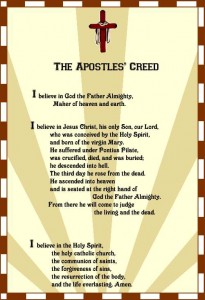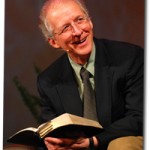After reading my brief overview posted someone wrote to me just now with this question:
Interesting… so if Song of Songs is “not a book about Christ” why is it in the Bible? The way I understand the Old Testament and, it seems, the way Christ understood it, is that it is ALL about Christ. The book of Hebrews rather liberally applies the temple, sacrificial system, and priesthood to Christ… why not the Song?
My Response: It is a huge oversimplification to say that ALL the Old Testament is about Christ. Of course, much of it does point to Christ. Jesus was able to reveal much of this to the two who walked with Him on the road to Emmaus in Luke 24:44 – “Then he said to them, “These are my words that I spoke to you while I was still with you, that everything written about me in the Law of Moses and the Prophets and the Psalms must be fulfilled.”
“Everything written about me” is not the same thing as saying “everything written is about me.”
There are countless things, people, places, etc, which simply are people, places and things.. and have no typological fulfillment in Christ. e.g. just at random, here’s a passage in Judges 1:33 Naphtali did not drive out the inhabitants of Beth-shemesh, or the inhabitants of Beth-anath, so they lived among the Canaanites, the inhabitants of the land. Nevertheless, the inhabitants of Beth-shemesh and of Beth-anath became subject to forced labor for them.
34 The Amorites pressed the people of Dan back into the hill country, for they did not allow them to come down to the plain. 35 The Amorites persisted in dwelling in Mount Heres, in Aijalon, and in Shaalbim, but the hand of the house of Joseph rested heavily on them, and they became subject to forced labor. 36 And the border of the Amorites ran from the ascent of Akrabbim, from Sela and upward.
Its important to stay within biblical parameters in our hermeneutics (Bible interpretation). The Amorites here are the Amorites… Mount Heres is Mount Heres… Akrabbim is Akkrabim.. etc., etc. It would be grossly incorrect to seek to force the text to make these people and places refer to “Christ” in some way.
The Song of Solomon is in the Bible because it is a wonderful God inspired love story and a reflection of God’s own love for His people. That a whole book of the Bible would be devoted to such a thing is breathtaking, and so far removed from the Greek concept that all fleshly activity of the body is sinful. (Sadly Greek thinking has had a huge influence on the Church through the centuries).
It is also true to say that the fact that an entire book of the Bible is devoted to the theme of romance, eroticism and sexual pleasure between a man and a woman in marriage shows us very clearly that God does not hate these things. He actually rejoices in them, being their Divine Author.
Think about the profound ramifications of this for a moment. He could have said to couples, “just mix substance A with substance B, put it in a pot and leave it overnight and whammo – you will have a child.” That was an option. Instead, God gave the human race sex with all that goes with it. God is certainly no killjoy, though He is quite clear regading the biblical boundaries for sexual enjoyment and pleasure, namely marriage (between a man and a woman).
The Song of Solomon also teaches us that God has a wonderful purpose for marriage in and of itself. This is a wonderful encouragement for precious couples who for some reason are not able to produce children.
The hyper-allegorical school of thought has brought much confusion and harm to the Body of Christ (and society and culture at large) through the centuries – none more so than in the arena of marriage. If properly understood (without all the allegorical trimmings) this book would have been a huge corrective in Church history when many leaders in the Church promoted the idea that all sex was sinful and that marital sex was only ever to be engaged for the purpose of procreation. The Song of Solomon clearly teaches us otherwise.
Why could these gifted leaders of the Church not see what is obvious to us?
That is a question that is actually fairly simple to answer: because they saw the Song of Solomon through the lens of the allegorical method of interpretation and therefore saw it as being ALL about Christ and His Church, rather than what it actually is, a book about romantic love.
The Hebrew people never viewed this book as an allegory of God’s love for Israel. As I pointed out before, that is why boys were not allowed to read it until they were considered adults in society. All understood what the book was truly about.
It is a rich and deep book and worthy of our study.

 There are a couple of complicating factors. The first is how we use the English word, ‘hell’ to translate various Hebrew and Greek words. The second is the history and meaning of the phrase in the Apostles’ Creed, “he descended into hell”. Let me now try and unpack these issues in turn.
There are a couple of complicating factors. The first is how we use the English word, ‘hell’ to translate various Hebrew and Greek words. The second is the history and meaning of the phrase in the Apostles’ Creed, “he descended into hell”. Let me now try and unpack these issues in turn.
 Dr. John Piper:
Dr. John Piper: Perhaps you can relate to this – Divine election does indeed seem to be clearly taught in the Bible. Passages such as Romans 8 and 9, Ephesians 1 and 2, John 3, John 6, John 10, John 17, and many others, make a convincing case. However, certain verses, at least at first glance, seem to present a different picture.
Perhaps you can relate to this – Divine election does indeed seem to be clearly taught in the Bible. Passages such as Romans 8 and 9, Ephesians 1 and 2, John 3, John 6, John 10, John 17, and many others, make a convincing case. However, certain verses, at least at first glance, seem to present a different picture. I read this short article by Dr. John Piper today and thought it was well worth passing on:
I read this short article by Dr. John Piper today and thought it was well worth passing on: